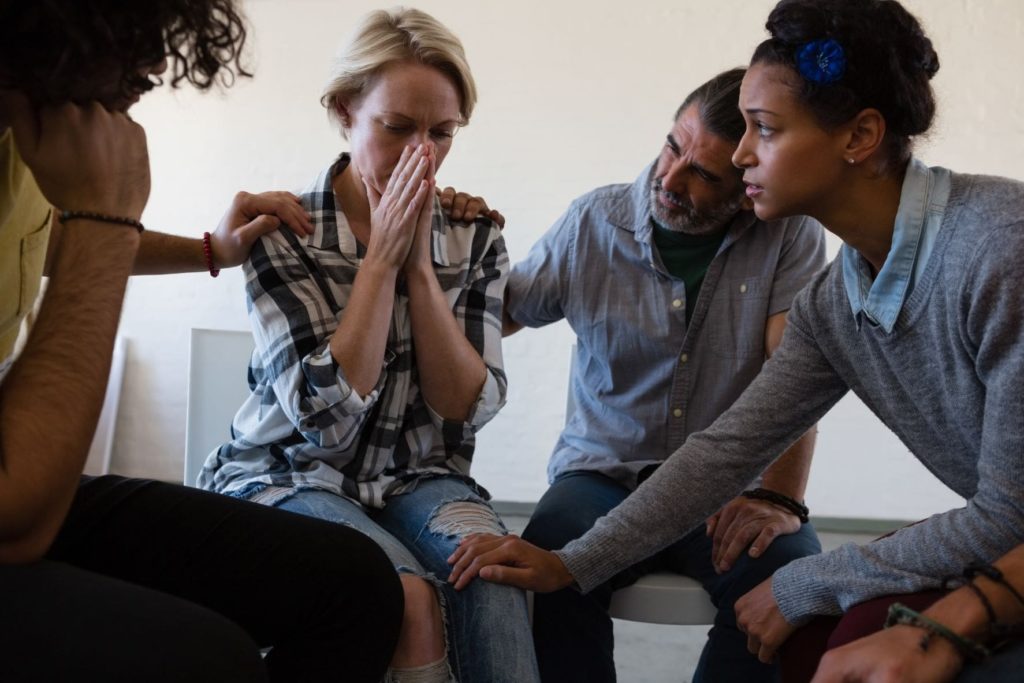Grieving the Addiction

Grief has a major role to play in addiction recovery. Yes, many folks step into recovery having experienced loss and trauma, often many losses and several traumatic events, and unresolved grief can certainly compound other challenges encountered in early recovery. Grief’s role extends beyond these past events, however. While it’s true that the grief process is usually associated with the loss of a loved one, important possessions, or important jobs and relationships, it is also the process that we move through when we leave behind a long-time way of living or a way of seeing ourselves.
The grief process is often stimulated by big changes. The step into recovery from a life of active addiction is about as big as it gets. It’s important to understand the role of grief, specifically in this regard, in the recovery process. That understanding can significantly ease the passage. Before we explore the grief process itself, it might be helpful to name some of the losses people experience when they begin the process of becoming sober.
The Addiction and All the Things that Go With It
No matter how long people live in their addictions, there are certain features that become part of their lives. The substance, the patterns associated with obtaining, using, and recovering from that substance, and the people and places they encounter are all woven into the addict’s life.
Another feature of addiction is often a certain sense of freedom. This may sound strange since for many, by the time they reach the point where recovery is either necessary, desirable, or both, addiction can feel like bondage. Freedom may not feel like the right word. It might be more apt to say that a certain lack of responsibility is intertwined in addiction for many folks. During active addiction, things like the groceries, a regular job, child-care, and relationship maintenance fall to the wayside. In early recovery, these things become important again, and the shift can be challenging.
Even when sobriety is recognized as a positive and even desirable choice, leaving these things behind can stimulate the grief process. The reason is actually fairly simple. The human brain essentially attaches to the things that receive its attention. The more attention, the more attachment. The more attachment, the more challenging it is to release and change. Grief is the process of releasing and changing.
The 5 Stages of Grief in Early Recovery
Though there are several stage models of grief, the most enduring is Elizabeth Kubler-Ross’s 5 Stages model. Kubler-Ross first described the 5 stages of grief in 1969, and it has been used to explain and explore the grief process since then. Let’s look at the stages of grief as they relate to early recovery.
Denial is a form of shock that allows us to keep going when things are very painful rather than succumbing to overwhelming emotions. For an addict, denial protects them from the reality of their circumstances. They use denial to avoid responsibility for their actions and also to deter questions and concerns others may present about their behaviors. It isn’t uncommon for an addict to say something like, “I just have a few cocktails with dinner. I’m not an alcoholic,” or “I wouldn’t have gotten that DUI if that cop had been taking care of neighborhood crime rather than sitting there trying to meet their quota for the night.” In this first stage, the addict is unable or unwilling to manage the emotions they might experience by taking responsibility for their behaviors and clearly seeing the seriousness of their addiction.
Anger is a powerful emotion that can help us avoid the truth of loss, or in the case of addiction, anger can help us continue to avoid looking at the true nature of our addiction and our behaviors. In some ways, anger signals the step into the new reality, but the new reality isn’t desirable. When people experience the death of a loved one, it’s common for them to rail at the dead person, God, or doctors, etc. It’s also not uncommon for them to act out with anger and irritability toward others. For the addict, anger is often pushed out in the form of blame. The addict might blame friends, family members, spouses, children, employers and others for their substance use as well as other irresponsible behaviors. They might even deliberately or unconsciously pick fights or create other situations that allow them to justify their use.
Bargaining signifies another step toward the new reality, whether that’s acceptance after the loss of a loved one or a job, or an addict’s ongoing process of recovery. In this stage, the addict has begun to understand the seriousness of their addiction, but in order to maintain some level of control, they may try to negotiate terms. Bargaining represents that last ditch effort to prevent real change from happening. It isn’t uncommon to hear addicts in the bargaining stage say things like, “I know I was drinking too much. I’ve decided to limit myself to beer on Friday nights,” or, “please give me one more chance, I won’t let myself go that far again.”
In the fourth stage of grief, it becomes readily apparent that change is happening – the loved one has died, the job has ended, the divorce is real. This new reality feels bad, and sadness and even fear are not uncommon as we come to understand the loss but can’t see beyond it. This stage marks the real beginning of surrender for the addict, as they face the history of their addiction and the destruction that their behaviors may have caused. They may struggle with anxiety, confusion, and shame, and they may find it difficult to conceive of a life without their addiction.
In the final stage of grief, it’s as if our hands, knotted in fists until now, begin to open. Acceptance doesn’t necessarily mean that we like the new reality. We didn’t want to lose our loved one, our job, or our marriage, but we can see a life beyond the loss. Acceptance for the addict is similar. They may not always like the idea of sobriety, but they are able to see a life ahead, and they begin to understand that others have walked the recovery path and live sober, healthy lives. In this stage, the addict can see other possibilities. This stage is inevitable provided the addict stays on a recovery path.

The Truth of the Matter
The truth is that choosing sobriety and stepping into recovery doesn’t mean that everything is suddenly perfect, beautiful, and easy. In fact, early recovery can be really challenging. Difficult emotions, hard habit changes, relationship issues, and other tough circumstances are part of the recovery process. So is grief, and grief is inherently uncomfortable a lot of the time. There are some normal symptoms that come along with grief. Generally, the worst of these may persist for several weeks with gradual reduction over the next 2 to 3 months after the loss.
- Feeling overwhelmed or less capable than usual
- Feeling confused or having some short-term memory challenges
- Difficulty sleeping or feeling fatigued
- Loss of interest in normally enjoyable things
- Tearfulness or feelings of loss or longing
- Dreams or fantasies about using
- Anger, self-pity, or self-blame
- Over- or under-eating
If these symptoms persist, feel unmanageable, or cause significant dysfunction, it’s important to reach out for help. There’s no reason to try to push through alone, and help is available.
If you or someone you care about is struggling with substance use, you can use SAMHSA’s helpline at 1-800-662-4357 or use their Treatment Locator. We are also available to assist you here at Luna Recovery Services. You can reach us by calling 1-713-714-1761 or chatting with us live on our Contact Page.
Dr. Allaire received his Bachelors of Science in Biology from the University of Houston, as Valedictorian of the College of Natural Sciences and Mathematics, and his Medical Doctorate from Baylor College of Medicine, where he served as Chief Resident. He is the medical monitor for the Physician Counseling Committee of the Harris County Medical Society and the Medical Director of Serenity House Detox. Dr. Allaire specializes in medically assisted detox cases, treating patients in recovery from addiction or other mental health disorders, the medical assessment and monitoring of patients with addictive disorders, medical care related to eating disorders and the medical treatment of patients with mental health conditions.



